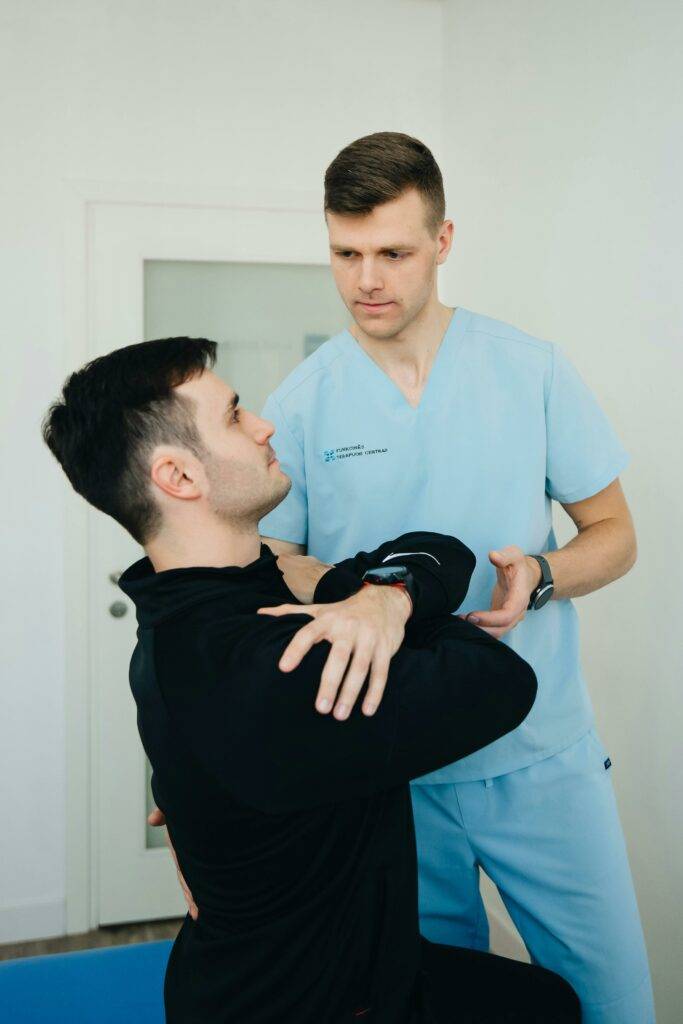Discover how non-surgical spinal decompression helps relieve chronic back and neck pain from a range of conditions in Durham, NC.
Back and neck pain are among the most common reasons people seek chiropractic care. For many people in Durham, NC, spinal decompression therapy offers a safe, effective, and non-invasive solution to long-standing pain. At Complete Chiropractic Durham, spinal decompression has helped countless local patients avoid surgery and return to the activities they love.
In this post, we’ll explore the conditions spinal decompression helps—including herniated discs, sciatica, degenerative disc disease, and more—so you can better understand if this therapy is the right option for you.
What Is Spinal Decompression Therapy and How Does It Work?
Spinal decompression therapy is a modern, computerized technique that gently stretches the spine in a controlled, targeted manner. This type of traction:
- Relieves pressure on spinal discs
- Creates negative intradiscal pressure to help reposition disc material
- Increases nutrient and oxygen flow
- Reduces nerve compression and irritation
The treatment is custom-tailored for each patient, based on their spinal condition and response during each session. Most patients describe it as relaxing—some even fall asleep during therapy.
To learn more, visit our Spinal Decompression Therapy page.
What Conditions Can Be Treated with Spinal Decompression?
Here are the most common conditions spinal decompression helps, and how this therapy promotes relief and healing:
Can Spinal Decompression Help with a Herniated or Bulging Disc?
Yes. A herniated disc occurs when the inner material of a spinal disc pushes out through a tear in the outer layer, while a bulging disc protrudes outward without full rupture. In both cases, the disc can press on nerves, causing pain, numbness, or tingling.
How decompression helps:
Spinal decompression creates a vacuum effect that can retract herniated or bulging material, relieve nerve pressure, and reduce inflammation.
If you’re in Durham, NC and suffering from disc pain, this non-invasive treatment may be a great alternative to surgery.
Is Spinal Decompression Effective for Sciatica?
Yes. Sciatica occurs when the sciatic nerve—running from your lower back down each leg—is compressed or irritated, often by a disc issue.
Common symptoms:
- Sharp, radiating pain down one leg
- Tingling or burning sensations
- Numbness or weakness in the leg or foot
- Pain worsened by sitting or standing
How decompression helps:
The treatment relieves lumbar disc pressure, easing sciatic nerve compression and reducing symptoms. It may also complement Shockwave Therapy for added benefit.
Our clinic in Durham, North Carolina sees many patients with sciatica who experience significant improvements with decompression.
Can Spinal Decompression Help with Degenerative Disc Disease?
Yes. Degenerative Disc Disease (DDD) is a wear-and-tear condition where spinal discs lose hydration and flexibility over time. This can cause pain, limited motion, and inflammation.
How decompression helps:
Though it can’t reverse disc degeneration, decompression reduces disc pressure and enhances nutrient flow, improving spinal function and reducing discomfort. It’s often paired with chiropractic care for long-term relief.
For residents of Durham, NC, this treatment can be part of an ongoing plan to manage chronic back pain without surgery.
What About Spinal Stenosis—Can It Help?
Yes. Spinal stenosis is the narrowing of the spinal canal, leading to compression of the spinal cord and nerves.
Symptoms may include:
- Cramping in the legs or lower back
- Numbness or weakness in the legs or arms
- Pain that improves when bending forward
How decompression helps:
By creating more space between vertebrae, decompression reduces pressure on the spinal cord and nerves, improving symptoms and mobility.
We regularly treat spinal stenosis at our Durham clinic with this gentle and effective therapy.
Is Spinal Decompression Useful for Facet Joint Syndrome?
Yes. Facet joints are the small joints between each vertebra that allow the spine to bend and twist. Overuse or arthritis can lead to inflammation and pain.
How decompression helps:
Decompression reduces pressure and irritation in the affected joints, restoring movement and reducing pain. It may be combined with laser therapy and muscle rehabilitation techniques.
If you’re experiencing facet-related discomfort in Durham, NC, decompression may provide long-term relief.
Can Spinal Decompression Help After Back Surgery?
Yes. Many people with Failed Back Surgery Syndrome (FBSS)—persistent pain after spinal surgery—turn to decompression therapy when surgical outcomes fall short.
Signs of FBSS:
- Chronic back or leg pain after surgery
- Limited mobility
- New symptoms developing post-surgery
How decompression helps:
It can relieve residual pressure on spinal discs and nerves that surgery did not fully resolve, offering a non-invasive path to continued healing.
We’re proud to offer this option in Durham, North Carolina for patients seeking an alternative to another round of surgery.
Is It Effective for Pinched Nerves?
Yes. Pinched nerves, caused by disc herniation or misalignment, can result in pain, tingling, or loss of strength.
How decompression helps:
By alleviating compression at its source, spinal decompression relieves pain and restores nerve function. Many patients benefit from pairing this with corrective exercises for longer-term recovery.
What Are the Benefits of Spinal Decompression Therapy?
Patients in Durham, NC choose spinal decompression for a number of reasons:
- It’s non-surgical and drug-free
- Tailored to your condition and comfort level
- Encourages natural healing
- Often pain-free and relaxing
- May reduce or eliminate the need for surgery
- No downtime—resume your normal routine afterward
Who Should Avoid Spinal Decompression?
Though safe for most, spinal decompression may not be appropriate if you have:
- Severe osteoporosis
- Spinal implants or fusion
- Tumors or fractures
- Spinal instability
- Pregnancy
Our chiropractors in Durham, NC will perform a detailed evaluation to ensure this therapy is appropriate and safe for your condition.
Ready to Explore Non-Surgical Pain Relief in Durham?
If you’re living in or around Durham, North Carolina, and struggling with chronic spinal pain, spinal decompression therapy may be the natural solution you’ve been looking for.
At Complete Chiropractic Durham, we specialize in personalized care plans that help you move better, feel better, and live better—without surgery or medication.
Schedule your consultation today and take the first step toward lasting pain relief right here in Durham, NC.





